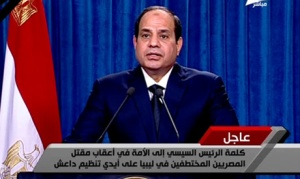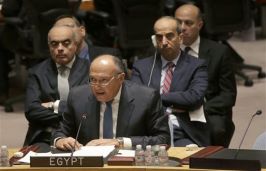I never thought I would be writing about an Egyptian military intervention into another country in my day and time, but the dramatic changes and developments in the armed conflict in Libya has posed the question of whether Egypt’s role in this situation was legal or not. At the same time, the question of which doctrine of the international law Egypt can use to justify the Airstrikes on Da’esh is raised – whether the self-defense and or protecting citizens abroad or assisting another state.
On 15 February 2015, a video was released showing images of 21 kidnapped Coptic Egyptians being killed by a militant group declaring their loyalty to ISIS or Da’esh. As a response to this video, which I don’t think is appropriate to share; the Egyptian president announced a week of mourning over the victims and called for an urgent meeting with the National Defense Council. A few hours after the meeting, Egyptian Air forces launched strikes against militant targets and fighters of ISIS in Derna, Libya.
These air strikes open the question again about the legality of the Egyptian Military intervention inside the Libyan territory especially after the different statements from the President Sisi and the Foreign Affairs Minister in UN Security Council meeting.
The historic background of the Libyan situation is significant in this context. Libya today has divided into a violent political struggle between two major powers: the internationally recognized, Tabruk parliament and Tripoli’s parliament. The Islamist groups cooperated with Misrata’s forces to stage a counterattack in Tripoli and occupy the capital. This forced the newly elected parliament into exile to Tabruk to be under the protection of general Haftar.
Alongside with this political struggle and declining situation, in June 2014, the jihadist group Majilis Shura Shabab Al-Islam (the Islamic Youth Shura Council) in Derna announced its allegiance to the Islamic State in Iraq and Syria (ISIS). A few months later, the organized militant group in Egypt, Ansar Beit Al-Maqdis, which continually attacked the governmental buildings and military bases, also announced its allegiance to ISIS and changed its name into Wilayet Sinai or the Sinai State. This link between the groups increases the suspicion of cooperation between the two groups and increases military operations against the Egyptian government and Army.
The use of language
A few hours, after the president Abd El-Fatah El-Sisi’s speech on the killing of 21 Christian Egyptian in Derna by militant group loyal to ISIS, Egyptian Air forces launched strikes against militant targets and fighters of ISIS in Derna, Libya.
 The Egyptian citizens reacted to the video of the killings with significant anger and asked for revenge and reprisal attacks. During his speech president Sisi used the word “the right of response” to the killing of the Egyptians in Libya. Also, the ministry of Foreign affairs issued a statement after the airstrike stating that the airstrikes were under legitimate right of states of self-defense individually or collectively and its right to protect its citizens abroad. The linguistics used in both statements refers to framing the airstrikes towards the Egyptian citizens and protecting the citizens. The president statement directed to the citizens, and to settle down the anger of the citizens, but at the same time, statements like revenge or reprisal are not appropriate to be used in the international law context.
The Egyptian citizens reacted to the video of the killings with significant anger and asked for revenge and reprisal attacks. During his speech president Sisi used the word “the right of response” to the killing of the Egyptians in Libya. Also, the ministry of Foreign affairs issued a statement after the airstrike stating that the airstrikes were under legitimate right of states of self-defense individually or collectively and its right to protect its citizens abroad. The linguistics used in both statements refers to framing the airstrikes towards the Egyptian citizens and protecting the citizens. The president statement directed to the citizens, and to settle down the anger of the citizens, but at the same time, statements like revenge or reprisal are not appropriate to be used in the international law context.
Therefore, framing the argument and defense of the attack through “the right of response” is to legitimate the illegitimate act.
A few days later, the weakness of the doctrine of the right of response and the excuse of protecting of citizens abroad which had been used by the president and the ministry of foreign affairs was clear. The use of this doctrine in international law is rare and is not preferred. Therefore, during the UNSC urgent meeting in relation to the situation in Libya, the Foreign Affairs Minister instead commented on the Egyptian airstrike in Libya by using a different argument for the strikes, by stating “Egypt has decided to respond to the requests and needs of the Government of Libya and has provided military assistance”. The Foreign Affairs Minister’s statement framed the airstrikes as assisting the Libyan government in the war against terror after asking for help as part of consensual intervention, as the coordination and assistance of another country is not a violation against international law. Therefore, Egypt’s strikes over the Libyan territories were not in contradiction of the United Nations charter and customary international law. This new statement is directed to the international community, thus the language used must be the most appropriate to be accepted in doctrine and according to international law.
The word and framing used is important in international law and in strengthening the legitimacy of the Egyptian airstrikes in Libya. The justification of airstrikes based on the self-defense and/or protecting civilians abroad arguments or the right of response are weak in international law in comparison to the argument of the assistance of another country in the war against terrorism. The president used the phrase right of response to comment on the killing of Egyptians in Libya because he was directing the statement to Egyptian citizens while the Minister of Foreign Affairs could not use a weak legal argument in his speech to the international community justifying the airstrikes. Therefore, he used the argument of state requesting assistance of another state. The linguistics used by the president and foreign affairs minister differ because each one of them is talking to a different audience. Framing and language of law is just as important domestically as it is internationally.

Very good Ahmed. I think your topic is very interesting especially that it is recent. I think the world is focusing on Egypt’s legality of intervention in Libya and is ignoring what was done by ISIS towards the Egyptian citizens. There is no need to question legality because this “reaction” by the Egyptian government is simply justified by the fact that ISIS has attacked Egyptian citizens first. One cannot question any type of legality since there was an illegal action taken before by ISIS. I really like your part of the “use of language” because I think it played a role within the Egyptian society by President El-Sisi.
LikeLike
thanks Hoda for your comment. I think it is important to understand the base of the Egyptian “reaction.” i think we can justify a revenge or reprisal in international law, just because it is towards a terrorist group ISIS. countries actions defer from the terrorist actions. countries should follow the international law. in relation to the use of language, i think that understanding the different statement by the Egyptian government will give a clearer idea about the main base and justification of the attack.
LikeLike